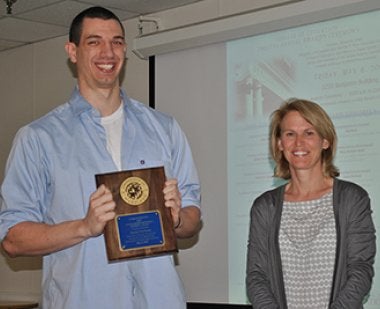
Dr. Jennifer King Rice presented Daniel McNeish with the College of Educations Outstanding Doctoral Student award in 2015.
COLLEGE PARK, MD (March, 2016) Dr. Daniel McNeish, who graduated last year from the Department of Human Development and Quantitative Methodologys Ph.D. program in Measurement, Statistics, and Evaluation (EDMS), has been appointed an assistant professor in the Methodology and Statistics Department at Utrecht University in the Netherlands.
According to Dr. McNeish, his new appointment involves both research and teaching. Presently, he is teaching Multivariate Statistics at University College Utrecht, the university’s international, English-only liberal arts college. His research will focus on methods to model data with small sample sizes, particularly dealing with clustered data, which is common in education research.
As a student at the College of Education, Dr. McNeish published articles alongside faculty members Drs. Laura Stapleton, Rebecca Silverman, Gregory Hancock, and Jeffrey Harring. Lauded by Dr. Hancock as “one of the top two students [he has] ever worked with,” McNeish received UMD’s Flagship Fellowship in 2013, the Graduate School’s All-S.T.A.R. Fellowship in 2014, and the College of Education’s Outstanding Doctoral Student award in 2015.
Of his experiences in the EDMS program, Dr. McNeish says the freedom he had as a student was most helpful in preparing him for an academic career. Unlike many Ph.D. programs, EDMS does not employ an advisor/advisee model, in which graduate students work exclusively or at least primarily with a single faculty member. Instead, EDMS doctoral students work with several professors, each an expert publishing in top journals.
“That was a huge asset to me. It gave me a very broad perspective,” Dr. McNeish says. “Not relying on an advisor to feed me research ideas was extraordinarily helpful. I learned not only how to do research but how to target topics that need to be researched.”
And of his work at EDMS, Dr. McNeish is proudest of his contribution to an idea concocted by Denis Dumas, a master’s graduate of EDMS who now studies in the College’s doctoral program in Human Development.
“Denis told me about a completely unconventional way of measuring abilities and academic potential,” Dr. McNeish recalls. “He wasn’t sure what the statistical model would be. He drew a picture for me, and it looked like a model I’d read about while working with Jeff Harring. We designed an extension for that model. When we presented it at a conference, the statistician who had written some dozen papers about the model was in attendance. I was prepared to get ripped apart. Instead, he told me afterwards that he thought it was a great extension. It was cool to listen to someone else's idea, have the theory go over my head, but still be able to contribute to that idea from a statistical perspective.”
Even as Dr. McNeish looks to the future at his new post, he continues to work with his former teachers at the College of Education. The journal Psychological Methods has just accepted a paper he co-authored with Drs. Stapleton and Silverman, arguing that a very popular statistical method, Hierarchical Linear Models, may not be necessary in many scenarios in which it is used. Multivariate Behavioral Research has conditionally accepted another paper, based on Dr. McNeish’s dissertation and also co-authored with Dr. Stapleton, which demonstrates that certain statistical methods can model clustered data fairly well with as few as four clusters, much lower than the minimum of 30 clusters conventionally recommended for research.
Utrecht University’s Methodology and Statistics Department is one of the world’s largest academic departments focusing on statistical methods in behavioral sciences.
Dr. Daniel McNeish completed his Ph.D. in Measurement, Statistics, and Evaluation in 2015. His research centers around statistical models for correlated data, methods for challenging data structures, small sample sizes in particular, structural equation and latent growth models, and applying statistical methods used in other disciplines to behavioral science problems.
Dr. Laura Stapleton is an associate professor in the Measurement, Statistics, and Evaluation program. Her work looks at analysis of administrative and survey data obtained under complex sampling designs and multilevel latent variable models, including tests of mediation within a multilevel framework. She is the associate director of research for the Maryland State Longitudinal Data System Center.
Dr. Rebecca Silverman is an associate professor in the Department of Counseling, Higher Education and Special Education. Her research focuses on early prevention and intervention for children at risk of experiencing reading difficulties.
Dr. Gregory Hancock is a professor in the Department of Human Development and Quantitative Methodology, where he directs the Measurement, Statistics, and Evaluation program. His research examines structural equation models, latent growth models, and latent variable experimental design and analysis. He is also the director of the Center for Integrated Latent Variable Research (CILVR).
Dr. Jeffrey Harring is an associate professor in the Measurement, Statistics, and Evaluation program. His research focuses on applications of statistical models for repeated measures data, nonlinear structural equation models, and statistical computing.
-end-
For more information on the College of Education, visit: www.education.umd.edu
or contact
Audrey Hill, Associate Director of Communications, at: audreyh@umd.edu


